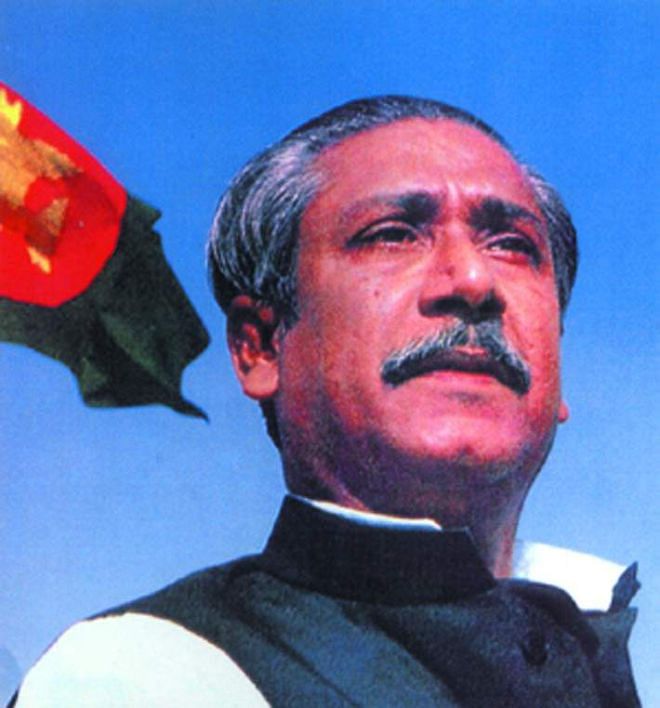The incomparable braveheart called Bangabandhu
The incomparable braveheart called Bangabandhu

A brave soul named Sheikh Mujibur Rahman, fondly called Bangabandhu by his people, was born on March 17, and on March 26, 1971, his lifelong dream of emancipating the Bengalis came true with the rise of the sovereign state of Bangladesh. As the nation is poised to celebrate the Independence day it is only proper that a grateful nation and the world beyond gets to know the real dimension of the towering statesman. In fact, the architect of our freedom needs to be studied by all.
The aggravated tragedy for the Bangladeshi society is that even thirty-nine years after the deplorable assassination of the iconic leader of our national emancipation, there are ludicrous and demeaning efforts to compare Bangabandhu with others who perhaps, at best, will find mention in the footnotes of our history.
For those sick minds that find justification for the tragic happenings of August 15, 1975, there is an historical necessity to tell and record the truth for the present generation as well as posterity that Bangabandhu was incomparable and will remain so for all the days to come.
Bangabandhu is incomparable because he was courageous, and it was his moral and physical courage combined that was unprecedented in the annals of our historic political struggle. Come to think of it, the man spent almost the best part of his youth in prison for the liberation of his people.
Imagine the initial years of the decade starting 1960, when the jackboots of the military junta took upon itself the task of teaching the nation about the basics of democracy and found spineless collaborators from this part of the world; think of that time when East Bengal's political world was pathetically lackadaisical and courage was in short supply. It was in such circumstances that the Bengalis had to be awakened from their somnolence, if not deep slumber.
The sensitive and sentimental Bengalis awoke, but only after the poet of politics took charge of a fledgling party and declared the historic Six Points that, by all estimation, were a prelude to our total economic and political self-rule. Let any discerning mind take a look at the Six Points and try to understand why Bangabandhu was repeatedly incarcerated. The architect of our freedom could look beyond his times. Was there anybody in the political landscape at the relevant time who had the gift of such courage and farsightedness?
Bangladeshis, particularly those born after 1970, must know that Bangabandhu was not one of those “boneless wonders” for whom expediency was all. He had the courage to never submit or yield and was a solid rock in the wilderness of shifting sands. He spoke loud and clear for his convictions and had the resolute courage to stand up in support of his views. His inner strength enabled him to be dignified and hold his head high despite the adversity. He faced repeated imprisonment with ease while others did not venture to wander beyond the safe provision of personal gratification.
The 1960s were a time when we were helpless and in the grip of some all-powerful autocrat; our limbs were paralysed and our minds deadened. At that time the dominant impulse in the then East Pakistan was that of pervasive, oppressing, strangling fear; fear of the army, the police, the secret service, fear of the official class; fear of laws that suppress and of prison. Deliverance from such fear was possible because of the manifestly energising fire that Bangabandhu lit each time he spoke.
All citizens, particularly students of history, may recollect the brave stance that Bangabandhu took to ensure the exit of the last Indian soldier from Bangladeshi soil by March 1972. It is rightly doubted whether any other leader would have succeeded in accomplishing such an onerous task. If not for anything else, at least for this supreme act of courage and statesmanship Bangabandhu's memory will remain ever enshrined in the hearts of grateful Bangladeshis. The sector commanders of our Liberation War know that better than anyone else.
The way Bangabandhu conducted himself while confronting the overbearing and scheming top Pakistani military brass in Dhaka in March 1971 spoke volumes of his courage and sense of honour. Persons who have seen the transcriptions of those historic meetings bear testimony to Bangabandhu's bravery and candidness. Both in incarceration and in facing the assassin's bullet Bangabandhu did not wilt or cower.
History has conferred on Bangabandhu such an immortal honour that even from an unpretentious tomb he exerts an authority over the nation which is unparalleled and majestic in its poignant history. No lengthened scroll or praise-encumbered stone marked his grave for a painfully long time, but it linked the poor to the hearth of its soul.
“Un-seduced by flattery, undismayed by disaster or the trumpet sounds of a doom,” Bangabandhu confronted life with tight-lipped courage. His unquenchable spirit was to set sail beyond the sunset. The walls were crumbling and the fabric of a mighty state was collapsing but at the gates of dawn he stood like a heroic figure challenging the new day.
The writer is a columnist of The Daily Star.